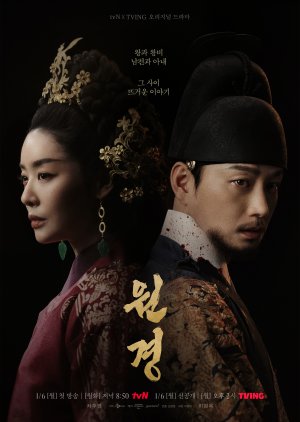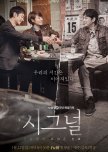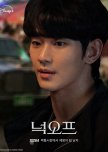Throne of Thorns: A Queen's Rise and the Price of Power
Set during the late Goryeo and early Joseon periods, "The Queen Who Crowns" depicts the dramatic rise and fall of power within Korea’s royal court. The series follows Queen Won Gyeong (born Min Je), a fierce and intelligent woman from a prestigious family of high-ranking officials. Her marriage to Yi Bang Won (Prince Jeong An), the ambitious and strategic son of King Tae Jo—the founder of the Joseon dynasty—places her in a pivotal position of influence.When King Tae Jo names his second son, Yi Bang Gwa, as crown prince instead of Yi Bang Won, Queen Won Gyeong and her husband conspire to overthrow the decision, orchestrating a political coup that eventually places Yi Bang Won on the throne as King Tae Jong. However, their victory sows seeds of discord. King Tae Jong’s insecurities about his queen's influence, alongside his efforts to consolidate power by taking concubines, strain their marriage. This leads to intense power struggles between the king, queen, and the Min family as the king grapples with loyalty, control, and the fear of being overshadowed by his formidable wife.
The narrative’s exploration of ambition, betrayal, love, and the price of power creates a compelling and complex historical drama. Themes of loyalty and insecurity highlight the precarious nature of political authority and personal relationships. The explicit version of the series attempts to heighten emotional depth and tension with mature content, though it has polarized audiences.
Supporting characters, including political allies and rivals, concubines, and members of the Min family, round out the cast with layered performances that add depth to the story’s intrigue.
The drama’s visual appeal is striking. The palace settings, lavish costumes, and period-accurate props immerse the audience in the grandeur of the Joseon era. The explicit content has drawn mixed reactions. While some viewers appreciate its boldness in portraying the complexities of marital and political intimacy, others feel it detracts from the plot's historical intrigue. This duality has likely influenced the show’s ratings, though the storytelling remains robust and engaging.
"The Queen Who Crowns" offers a rich tapestry of history, power, and human emotion. It stands out for its strong storyline and compelling performances. The tension between loyalty, love, and ambition resonates deeply, reflecting the timeless nature of political drama. While the explicit content divides opinion, it does not overshadow the show’s broader strengths in narrative and characterization. For fans of historical sagas, this series delivers intrigue, complexity, and memorable drama.
Vond je deze recentie nuttig?

A Compelling Dive into Power and Betrayal
Watching the first two episodes of "The Queen Who Crowns" was a captivating experience. The story immediately pulls you into the turbulent world of Queen Wongyeong and King Taejong, where ambition and power define every move. I was struck by Wongyeong’s resilience and intelligence—her bravery during the assassination attempt had me on edge, rooting for her survival and strength.The tension between Wongyeong and Taejong is palpable, and it’s heartbreaking to see how his insecurities lead him to undermine the very person who’s helped secure his throne. The scene where he takes her servant as a concubine felt like a gut punch, a stark reminder of the harsh realities women faced in that era.
The performances, especially by Cha Joo-young, are outstanding. She brings such depth to Wongyeong, portraying her as both a fierce strategist and a vulnerable woman navigating a perilous court. The visuals—rich costumes, detailed sets—transport you right into the heart of the Joseon Dynasty, making the drama feel all the more real.
Overall, these episodes left me eager to see how Wongyeong will continue to assert her power and what sacrifices she might have to make. It’s a beautifully complex story that promises a lot of emotional and political twists, and I’m excited to see where it goes next.
Vond je deze recentie nuttig?

Deze recentie kan spoilers bevatten
A Historical Drama with a Family Twist!
When a man’s fragile ego is bruised, he will go to any extent to humiliate the person responsible for his hurt!The storyline of this historical is centered around King Tae Jong’s efforts to antagonize his loyal wife and her family. Set in the Goryeo period, the show focuses on Queen Won Gyeong rise to power as her husband assassinated the former Crown Prince and usurped the throne. While they were an ideal couple before that (or Prince Yi Bang Won was good at acting docile, we will never know), the King’s intentions change on ascending the throne. As it’s heart, it might seem like family drama, but the show revolves around the political tyranny and rebellion that occurred not once but twice in that era, before King Tae Jong rose to power. A husband and wife’s squabble might not seem that interesting; especially when all he does is take multiple wives to displease her. But the show is more focused on Queen Won Gyeong’s dominant personality, which the King is unable to accept.
Read the complete article here-
https://kcdramamusings.wordpress.com/2025/01/07/the-queen-who-crowns-first-impressions/#more-1469
Vond je deze recentie nuttig?

A Lion Out of Chains: A Review of The Queen Who Crown
1.OThe Queen Who Crown is an ambitious drama that dives deep into themes of power, freedom, and the complex dynamics between a King and Queen. While it aims to showcase strong characters, particularly the Queen, its portrayal raises questions about how strength and power are depicted, especially in women.
The Queen is undeniably a force to be reckoned with, but her strength is portrayed through a lens of relentless control and ruthless ambition. Having tasted power, she clings to it with an almost manic determination, willing to go to any lengths to retain it—even if it means betrayal, manipulation, or worse. While this makes for a dramatic and compelling narrative, it risks perpetuating a troubling message: that power corrupts women more destructively than men.
The King, on the other hand, is shown as a character rediscovering his agency. Once a passive, seemingly submissive figure overshadowed by his controlling wife, he emerges as a lion unchained when he ascends the throne. His transformation feels empowering, a reclamation of identity and freedom. However, his rise contrasts sharply with the Queen’s descent, which leans heavily into the trope of a “power-hungry woman.”
The drama’s intention to showcase a strong woman is clear, but its execution falters. A truly strong woman doesn’t have to be depicted as heartless or consumed by power at the expense of others. The Queen’s actions, from betrayal to outright scheming against her King, paint a picture of a character more concerned with domination than leadership. While this may serve the narrative tension, it inadvertently suggests that women in power are inherently prone to corruption and cruelty—a troubling implication.
In contrast, the King’s character arc suggests that freedom and strength are inherently virtuous when reclaimed by a man. This dichotomy may leave viewers questioning the fairness of the drama’s messaging. Does it challenge the status quo, or does it reinforce outdated stereotypes?
Ultimately, The Queen Who Crown is a captivating tale of power and transformation, but it walks a fine line. While its portrayal of the Queen adds layers of intrigue, it risks overshadowing the nuance of what a strong, empowered woman can truly be. Strength doesn’t have to equate to ruthlessness, and power doesn’t have to corrupt. The drama might have done well to balance its depiction of ambition and morality, especially in its female lead.
2.O
The Queen Who Crown offers a gripping exploration of power dynamics, desires, and the shifting sands of authority within a royal marriage. The character development of the King is particularly striking, as his transformation is nothing short of a revelation.
Before ascending to the throne, the King was portrayed as a subdued, almost docile partner—more his wife's pet than her equal. The Queen, accustomed to control, treated him as a submissive weakling, and he played the part well. But as the crown settled on his head, so did a newfound freedom and ferocity, one that reveals the depth of what he had repressed.
His evolution is both exhilarating and unsettling. The King’s untamed side begins to surface, a lion unshackled from chains, roaring with the power he now wields. The narrative brilliantly peels back the layers of his character, showing the desires and ambitions he had hidden beneath a quiet exterior. It’s fascinating to see how much he had bottled up, waiting for the right moment to emerge.
Meanwhile, the Queen’s journey takes a different turn. She is left grappling with the loss of control she once took for granted. Her attempts to reclaim power are as desperate as they are calculated, painting a vivid picture of a ruler who underestimated her counterpart. Her habits of domination, once effortless, now seem futile against the King’s burgeoning autonomy.
The dynamic between the two is electrifying—a dance of dominance and defiance, love and resentment. The storytelling captures the raw emotion and tension that come with shifting power. The King’s transformation feels liberating, while the Queen’s struggle to adapt to her diminishing influence makes for compelling drama.
The Queen Who Crown is an enthralling tale of identity, freedom, and the complexities of power. The King’s journey from submissive to sovereign is as captivating as the Queen’s realization that the reins are slipping from her grasp. It’s a must-read for anyone who enjoys stories of transformation and the unpredictable nature of relationships at the highest stakes.
Vond je deze recentie nuttig?



































